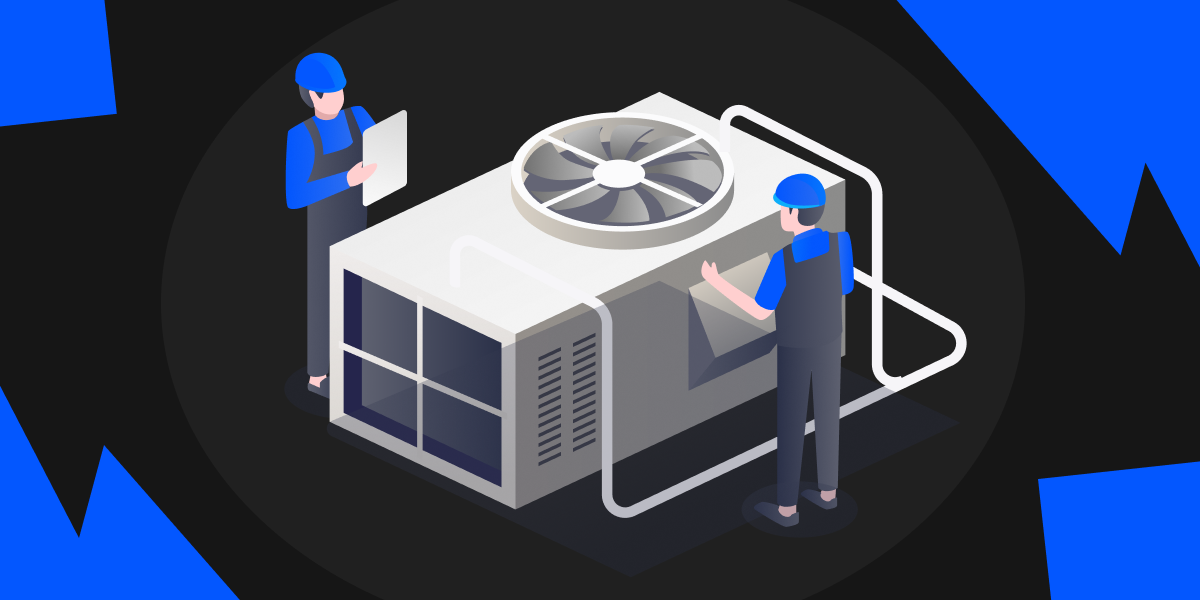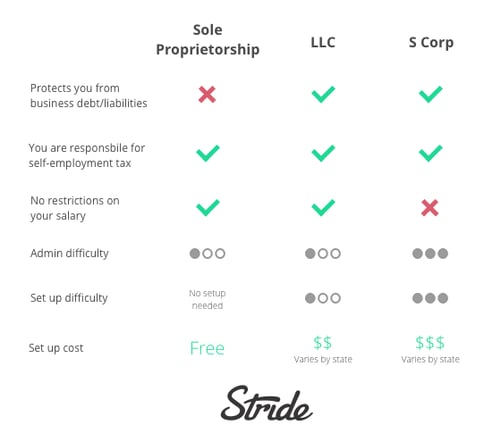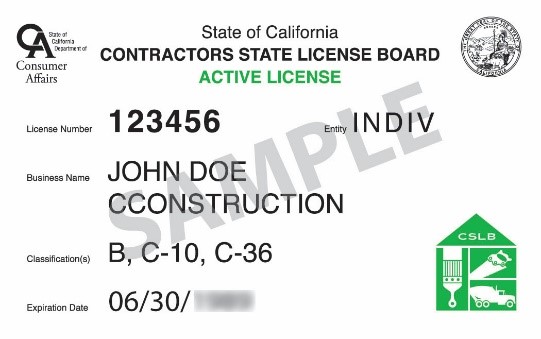How To Start an HVAC Business | A Complete Guide
There are many keys to starting an HVAC business. So if you're wondering if it's right for you, learn more about how to start an HVAC business here.

The HVAC market hit a healthy USD 158.8 billion in 2022. As the demand for energy-efficient and reliable heating and cooling systems continues to rise, more entrepreneurs are entering this exciting industry.
In this comprehensive guide, we'll walk you through the essential steps to start your HVAC business, providing valuable insights and expert tips that will set you on the path to success. From understanding the market landscape and obtaining necessary certifications to crafting a winning marketing strategy and managing day-to-day operations, our aim is to equip you with the knowledge and tools needed to confidently establish and grow your HVAC venture.
Jump to:
-
Starting an HVAC Business in 9 Steps
-
Other Considerations When Starting an HVAC Business
-
Don't Wait To Start, Start Today
Starting an HVAC Business in 9 Steps
Embarking on a journey to building a well-rounded HVAC business might seem daunting, but following these well-structured steps will set you on the path to success.
1. Name and Register Your Company as an S Corp or LLC
Your first step is figuring out what to call your company and how you want to structure it.
To start, brainstorm a list of potential names – we recommend at least 5. Once you’ve found several names you’re comfortable with, proceed with registering your company with the government. You’ll need to first decide on whether you want to form an S Corporation (S Corp) or a Limited Liability Corporation (LLC).
Each structure has its own set of advantages and disadvantages. If you’re uncertain about which option is the most suitable for your business, it might be beneficial to consult a business attorney.
After deciding on the type of business structure, you’ll be tasked with completing a laundry list of forms with the state or federal government to finalize your registration process.
Since this depends on the type of business you’ve picked earlier, as well as the state you’re choosing to register your business in, we can’t provide an exhaustive list of links. However, there are a variety of business services (like Firstbase) that automate large portions of the process that you might be interested in.

Source: Stride Blog
Once registered in your state, you’ll have to apply for an Employer Identification Number (EIN) from the IRS so businesses can quickly identify your company for tax purposes.
Why is It NOT a Good Idea to Run an HVAC Business as a Sole Proprietorship?
You might be tempted to run your HVAC as a sole proprietorship rather than through a designated business structure. After all, sole proprietorships require significantly less paperwork, simplify taxation greatly (at the cost of combining your personal earnings with the business earnings), and generally require a lower operating cost to maintain.
But there are several reasons we recommend forming a separate entity for your business, like an LLC or C-Corporation.
First and foremost, when you operate as a sole proprietor, you’re opening yourself up to a world of potential liability if something goes wrong while providing your service. That’s because, as a sole proprietor, you’ve designated yourself personally and fully responsible for anything that goes wrong while carrying out business activities.
Choosing either an LLC or S Corps establishes your business as a separate entity, and protects your personal reputation and property.
Suppose someone sues your business after an accident. If you’re a sole proprietorship, they could sue you personally and go after your personal assets, including your home. If you operate an LLC, sure, they can sue your company. But when the business bank account hits zero, that’s it (generally) – your personal liability is limited.
Additionally, when you form a separate entity, such as an LLC or Corporation, you open the door for more capital and resources to help you develop and grow your business. Many public and private grant services offer startup capital to LLCs and Corporations, but not sole proprietors.
Finally, corporations provide a new option for taxing income at both corporate and individual levels. If your money stays in the business bank account year over year, it’s taxed at the federal + state corporate rates, which can be significantly lower than the individual rate for a given amount.
This can save you a ton of money in taxes over time, particularly at larger levels of volume.
2. Take Any and All Required HVAC Certification Courses
It's essential for those working in the HVAC industry to be up-to-date on their knowledge and skills. Different states have different requirements for certifications, but if you don't have them, it could put your business at risk of being shut down or fined by local authorities.
Taking HVAC certification courses is one way to ensure you have the qualifications. Here is a list of some of the most common certifications you may need to work in HVAC legally:
- EPA 608 Certification for refrigerant handling
- NATE Certification for technical expertise
- OSHA 10-Hour Safety Training Course
- HVAC Excellence Certifications in specific areas like heat pumps, gas furnaces, and air conditioning systems
Depending on your state or region, additional certifications may be required.
Make sure to research local regulations before starting your business so that you can be sure to comply with all laws and requirements.
3. Decide Which Services You’ll Offer and Price Them Accordingly
Your next step is to consider the services you want to offer and the prices you'll charge for them. You need to provide services that you have knowledge of or experience in, that customers need, and you can provide at a competitive rate.
Setting the correct prices is essential for success – too low, and you won't make a profit; too high, and customers may go elsewhere.
Installation
Installation involves installing new air conditioning systems or replacing old ones and other related tasks. To price this appropriately, factor in the cost of materials, labor costs for all workers involved, any permits needed from local authorities, and any other costs associated with the job.
When pricing each job, you should also factor in your profit margin so your business stays successful over time. And don’t forget to consider how you will handle warranties and any unexpected costs that may come up during installation.
Unit Maintenance
This optional service involves regularly inspecting and servicing a customer’s heating and cooling units to keep them running efficiently. Some of the services included in unit maintenance include:
- Checking for dirt buildup
- Changing air filters
- Testing controls and motors
- Cleaning coils
Consider the cost of materials needed to do the job (filters, lubricants, etc.), labor costs for technicians performing the work, overhead costs, and other factors such as travel time or disposal fees when pricing this service.
Repair
Repair services assure customers that you can handle any issues quickly and efficiently. When deciding whether or not to offer repair services, there are a few things you need to consider. First, it's essential to ensure you have the necessary skills and qualifications for carrying out repairs safely and correctly.
You should undertake training to acquire these skills before taking on any work. It's also wise to assess how much time will be required for each repair job and whether it will be cost-effective for your business.
Air Duct Maintenance
Air duct maintenance involves cleaning and maintaining the air ducts of a building's heating, ventilation, and cooling systems. This helps the system runs efficiently and filters out harmful pollutants or allergens from the air inside.
When considering adding air duct maintenance, consider the size and complexity of the system. Does it involve multiple stories or levels? How much labor is required to complete the job? Do you have access to tools and equipment? If so, be sure to determine a reasonable price for this service.
Take into account the time and cost of materials needed, as well as any potential risks associated with working on air ducts that may require additional safety precautions.
Commercial Versus Residential
Residential HVAC services typically include installations, repairs, and maintenance on existing systems such as home air conditioners or furnaces. On the other hand, commercial HVAC services may involve more complex projects like designing heat exchange systems for large buildings or industrial facilities.
When deciding which one to offer, consider your experience level with both jobs. Have you done any commercial work? If not, stick with residential until you have gained enough knowledge and experience for large-scale projects.
Additionally, think about the type of customer you want to target – do they need a one-time service or an ongoing relationship? It’s essential to price your services accordingly to make a profit while keeping customers happy.
4. Purchase Necessary HVAC Equipment
The appropriate tools and materials are essential to provide quality services. Ensure you invest in the following pieces of equipment:
- Refrigerant recovery machine. This helps recover, store, and recycle refrigerants used in servicing air conditioning systems.
- Vacuum pump. A vacuum pump removes moisture or other contaminants from an HVAC system.
- Gauges. These help measure pressures so technicians can diagnose problems with an air conditioner or heat pump system.
- Multi-meter. A multimeter measures and checks voltage, resistance, current, or continuity.
- Torches. Torches are necessary for soldering copper pipes when installing an HVAC system.
The right equipment will give you the tools you need to provide quality services and build your business.
5. Obtain Proper Business Licenses and Certifications

Source: California State License Board
While the requirements may vary from state to state, here is a list of your must-have permits before moving forward.
- Contractor's license. You will have to, at minimum, have work experience and pass an exam, depending on your state.
- Business license
- Air conditioning technician licensing (or other specialty licenses depending on your area of focus)
- EPA 608 certification for refrigerants
- An HVAC contractor license bond
Licenses are necessary to protect yourself, your customers, and the environment.
6. Hire Skilled HVAC Technicians and Customer Service Representatives
When starting an HVAC business, you must hire top-tier employees who will represent your company well. Skilled technicians can properly diagnose any customer issues and provide knowledgeable repair solutions.
Customer service representatives should be friendly and helpful to create a positive experience for clients. This can build brand loyalty and bring in more business over time. Hiring skilled employees also ensures that the job is done right the first time, saving money on potential return visits or costly mistakes.
7. Protect Your HVAC Business by Purchasing Insurance Prior To Serving Customers
Insurance will protect you and your business in case of a lawsuit or property damage. Not only does insurance cover any financial costs, but it also gives your clients peace of mind knowing their interests are protected.

Source: Korona POS
Additionally, many potential customers may require proof of insurance before they hire you for a job – so having coverage can help increase customer confidence and lead to more business opportunities.
8. Implement HVAC Software To Help Manage Your Business Effectively
There's a lot to remember when you're running your own company. That's why home services software is your friend. With so many options to choose from, here are four must-haves for any home services business:
- Invoicing and payment software. Streamline your billing process online, send invoices quickly, and get paid faster with invoicing and payment software.
- Booking software. Manage your appointments with booking software that makes it easy for clients to book appointments online from anywhere, at any time.
- Messenger tools. Keep in touch with customers using messenger tools to respond quickly to their questions and earn their trust.
- CRMs (Customer Relationship Management). Keep track of customer information in one place with a contact hub designed for HVAC businesses. Easily store contact details, manage leads, schedule follow-ups, and more.
With these handy software tools, you’ll have more time to go on calls and watch your profits rise.
9. Deploy Smart, Effective Marketing
You don't have to spend much money on marketing when starting out. As a new business owner, it's essential to be innovative and use the resources available. Free or low-cost options can help get the word out about your HVAC business.
Social Media
Social media is free, easy to use, and allows you to reach a broad audience quickly. You can post information about new services or products, special offers, and customer testimonials. You can also interact with customers by responding to their questions or comments in real-time.
Best of all, social media is very measurable – you can track the number of people who see your posts and measure their engagement levels, so you know what kind of content works best for your target audience.
Google Business Profile
Setting up a Google business profile makes it easier for potential clients to find you. This free service allows you to list your contact information and location, which can help customers quickly find the HVAC services they need.
Plus, when customers search for related keywords, your business will appear in local listings so that new clients can quickly locate you. A visible Google My Business profile also lets you show off photos of completed projects or services offered - giving potential clients an idea of what you offer before they even make contact.
Website
A website allows potential customers to easily access your services, products, and contact information at the click of a button.
If you don't have the coding skills necessary to set up a website yourself, using a dedicated done-for-you tool, like GoSite’s Sites offering, makes it easy and stress-free. We create an attractive, mobile-optimized website that looks sleek and loads fast – and it requires zero technical knowledge on your end.
Flyers and Handouts
Flyers and handouts are a great way to share information about your HVAC business. They can introduce potential customers to your services, advertise specials, and provide contact information. They’re affordable and easy to distribute in person or through the mail.
Local Networking Groups
Local networking groups allow you to meet other local business owners, spread the word about your services, and build relationships with potential customers and partners.
As a bonus, attending these events can help you gain valuable insights into the industry and local customer needs.
First-time Customer Promotions
Creating promotions to entice first-time customers is an effective way to get your HVAC business off the ground. Offering discounts and deals on initial services, such as free inspections or discounted repairs, can be a great way to attract new clients.
By providing value and incentives, you will be more likely to turn potential customers into loyal repeat clients who trust your expertise. This helps build customer loyalty while giving your business an edge over the competition.
Other Considerations When Starting an HVAC Business
You're almost ready to open your HVAC business. Before you do, there are some other considerations to keep in mind. Make sure you offer employee insurance and benefits for a competitive edge in the market.
Having an experienced accountant or accounting system in place, like Quickbooks, is important, too, as it will help manage all of the financial aspects of your business. With these steps completed, you'll be ready to start running a successful HVAC business.
Don't Wait To Start, Start Today
Starting an HVAC business is a great way to make a living, and there's no better time than now to take the leap. You've learned about getting licensed, having the right insurance coverage, creating a plan for marketing your services, and using software to make the process easier.
With these tips in mind, you're ready to start this exciting venture. So don't wait any longer – now is the perfect time to launch your own HVAC business and start making money!
%20(1)%20(1).png?width=340&name=Group%2012%20(2)%20(1)%20(1).png)




